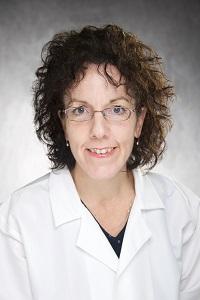Movement Disorders Fellowship
About the Program
Our fellowship within the Movement Disorders Division provides an option for one to two years of training. The one-year option provides a strong education in diagnosis and treatment of movement disorders for either future academic or community-based practice careers. The two-year option allows for additional training and development of research interests, mentored by our outstanding team of clinician-scientists.
Accreditation
There are no national certifying bodies for Movement Disorders Fellowships, but the University of Iowa Movement Disorders Fellowship is listed as one of 31 such fellowships in the American Academy of Neurology directory.
The Movement Disorders fellowship training is directly associated with our ACGME (#180-18-21-039) accredited Neurology Residency program at University of Iowa Hospitals & Clinics.
Clinical Services
The Movement Disorders Division provides comprehensive care for movement disorders of all types. Our Department is designated as both a Parkinson’s Foundation Center of Excellence and a Huntington’s Disease Society of America Center of Excellence.
In addition to the General Movement Disorders Clinic, we have the following specialty clinics within our Division:
Ataxia Clinic: Evaluation and management of patients with ataxia. Director Annie Killoran.
Botulinum toxin Clinic: Treatment of patients with dystonia, spasticity and other movement disorders. Director Christopher Groth.
DBS Clinic: Evaluation of patients with movement disorders for possible placement of deep brain stimulator and continuing programming of DBS. Director Qiang (Johnson) Zhang.
DLB Clinic: Multi-disciplinary clinic for the evaluation and management of patient with Dementia with Lewy Bodies. Directors Georgina Aldridge and Qiang (Johnson) Zhang.
Huntington’s Disease Clinic: Multi-disciplinary clinic for the evaluation and management of patients with HD. HD Neurologist Annie Killoran. Director Peg Nopoulos.
Educational Opportunities
In addition to clinical training, movement fellows will participate in a variety of educational experiences to foster skills in teaching, leadership, and academic involvement.
Weekly conferences
• Movement Disorders Case and Didactic Conference
Fellows will regularly work with rotating medical students, residents, and fellows from other medical disciplines.
Research in the Division
We have multiple ongoing clinical trials and research projects spanning all aspects of Parkinson’s disease. Starting with Robert Rodnitzky, MD, the founder of our division, we have been a member of the Parkinson Study Group (PSG) and the Huntington Study Group (HSG) since their inception.
Our Division is also a member of the NeuroNEXT through the institution, Dystonia Coalition, and the research network of Parkinson’s Foundation. We have participated in key multicenter observational studies and clinical trials funded by the NIH, NeuroNEXT, Michael J. Fox Foundation, PCORI, and the industry. Our projects benefit from the extensive research infrastructure at the University of Iowa, including the Institute for Clinical and Translational Science, funded by a NIH CTSA program grant for several decades.
The Narayanan lab studies how Parkinson’s disease affects how brain circuits function and is funded by several NIH grants and philanthropy. This knowledge could lead to new targeted therapies for challenging aspects of Parkinson’s disease such as dementia and cognitive dysfunction. Dr. Narayanan’s lab also studies new exciting treatments that can slow the progression of Parkinson’s disease or prevent its onset. They have multiple ongoing clinical trials and research projects spanning all aspects of Parkinson’s disease.
The Uc lab has been studying cognition, driving, diagnostic biomarkers, and the role of exercise in Parkinson’s disease with funding from the Department of Veterans Affairs, Department of Defense, NIH, and MJFF with extensive collaboration across the campus, including the National Advanced Driving Simulator (NADS).
Jeremy D. Greenlee, MD, our excellent DBS neurosurgeon, is a recent recipient of a Presidential Early Career Award for Scientists and Engineers (PECASE) and studies speech generation and effects of DBS with funding from the NIH.
How to Apply
We require applications be submitted via The San Francisco Match. Please refer to the match site for more information on application materials needed and match cycles.
Our People
Program Director

Program Administrator

Heather Clement, MBA
Faculty
- Christopher L. Groth, MD - Neurologist
- John Kamholz, MD, PhD - Neurologist
- Annie Killoran, MD, MSc - Neurologist
- Kumar Narayanan, MD, PhD - Neurologist
- Robert Rodnitzky, MD - Neurologist
- Ergun Uc, MD - Neurologist, Division Director
- Qiang (Johnson) Zhang, MD - Neurologist
- Jeremy D. Greenlee, MD - Neurosurgeon
- Peggy Nopoulos, MD - Neuropsychiatrist, Professor, Psychiatry Department Chair, Psychiatry Department Executive Officer; Psychiatry and Neurology
Other Caregivers
- Pascale Doresca, ARNP - Nurse Practitioner
- Cara Iyengar, MSW, LISW - Social Work Specialist
- Jacqueline Cicchese, MBA, PharmD - Clinical Pharmacy Specialist
- Lisa Preuschl, BSN, RN - Nurse, Neurology
- Margaret Gassmann, MSN, RN - Nurse, Neurology
- Tiffany Rodgers, CMA - Medical Assistant, Neurology
- Alyssa Bowker, CMA - Medical Assistant, Neurology
Ancillary Staff
- Afton Shulte - Clinic Services Specialist
Current Fellow
Prashant A Natteru, MBBS
Hometown: Bengaluru, India
Medical School: K.S. Hegde Medical Academy
Residency: University of Mississippi Medical Center
Fellowship: Cleveland Clinic Foundation (Epilepsy)
Why Iowa
After having studied the connectome of the seizure network activation during my epilepsy fellowship, I was intrigued by the intricate connections of the subcortical regions, specifically the basal ganglia. Hence, the additional training in Movement Disorders.
University of Iowa Movement Disorders Program offers expertise in both hypokinetic and hyperkinetic movement disorders – be it the basic science, clinical trials or the clinical care. It trains the fellow in various procedural aspects of Movement disorders, Botulinum toxin injections, and Deep Brain Stimulation. Most importantly, for me, the USP of this fellowship has been the faculty who go above and beyond in taking an active role in the fellows’ education and career interests.